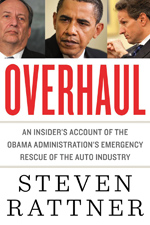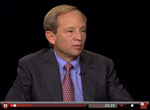Originally published in the New York Times
NEARLY four years after we were enlisted to fight the financial and auto-industry crisis, a small band of Treasury veterans returned one recent evening to the department’s imposing building in Washington, a neo-Classical-style structure bookended by statues of Alexander Hamilton and Albert Gallatin and a stone’s throw from the White House.
The occasion was a reunion hosted by the departing Treasury secretary, Timothy F. Geithner, to thank the now mostly dispersed recruits whose efforts had been central to saving the nation’s financial system and, by extension, the economy.
Tim, whose last day in the job is today, may have been the host, but in the minds of the 30 or so attendees, the reception was implicitly about his leadership. After all, it was his superb judgment, deep well of experience and extraordinary work ethic that ultimately extinguished the conflagration of 2007-9.
As we mingled over cocktails and canapés in the ornate Diplomatic Reception Room, the mood was mostly relaxed, a sharp contrast to the fear and occasional moments of near panic that had pervaded the building four years earlier.
In those early days, the financial system was near collapse as banks struggled to finance themselves, the stock market hit repeated new lows, and each dawn seemed to bring only fresh terrors.
Tim and his team methodically chipped away at the dizzying array of challenges as they faced skepticism in the markets and criticism from all fronts. As I watched the group at work, the familiar lines from Tennyson — “cannon to right of them, cannon to left of them” — reverberated through my head.
Conservatives brayed that government should stay out of the private sector; liberals bleated for nationalizing the banks. Fortunately, Tim kept his head while all around him, others were losing theirs.
After a round of handshakes and hugs as we became reacquainted, the remarks commenced. As happens at most celebratory events, each speaker began with a mix of anecdotes and humor. But at this one, every speaker concluded with a deadly serious reiteration of the importance of the work that we had done and an expression of gratitude for the sacrifices, personal and professional, that were made.
The rhythms in the room shifted with the speakers: lighthearted during the telling of anecdotes, self-satisfied at having proved the naysayers wrong, and somber as each of us reflected back on that extraordinary period of our recent history.
I stood a bit apart, as my job — leading the 14-member task force to rescue the auto industry team — seemed, in hindsight, easy compared with the work of others. Mostly unencumbered by the need to deal with Congress or other agencies, our task force was able to operate much like a private-sector firm, reporting every day or so to Tim and our other boss, Lawrence H. Summers, the Harvard economist who was then the head of President Obama’s National Economic Council.
I barely knew Tim when he asked me to join him at the Treasury Department. We never developed a social friendship. But I quickly realized why his depth of experience and straightforward manner inspired such loyalty and respect.
Tim had slid into the Treasury seat after a grueling tenure as president of the Federal Reserve Bank of New York, a time marked by the crash of the housing market in 2007, which tipped the national economy into recession by the end of that year.
Like most others, economic experts in President George W. Bush’s administration and at the Federal Reserve had been late in recognizing the magnitude of the problem, which quickly spread to engulf some of the country’s largest financial institutions. But as we now know from recently released transcripts of the Fed’s policy arm, Tim was ahead of many of his colleagues at the Fed in calling for action.
“I believe the arguments work in favor of doing more now rather than less,” he said at a September 2007 meeting of the policy body, known as the Federal Open Market Committee.
Fifteen months later, Tim had left the Fed for the new president’s cabinet, and the early reviews were tough. He had spent most of his career as the consummately capable, technocratic inside player — earning his stripes at the Treasury Department during the Clinton administration and then working at the International Monetary Fund. His boyish looks and low-key manner didn’t immediately inspire confidence.
And much of the country was understandably furious about the bank bailouts (even though they ultimately produced a profit for taxpayers). In retrospect, perhaps more could have been done to penalize the management and stakeholders of the financial institutions.
But unlike General Motors and Chrysler, the banks did not have an organized bankruptcy or other forced restructuring mechanism available to them, because of the intricate and interlocking obligations of the financial system.
In addition, policy makers under Presidents Bush and Obama had agreed that a financial rescue, on reasonable terms, was needed to help the banks rebuild their capital positions.
To be sure, Tim’s successes were not unalloyed. With limits to his authority and the toxic political environment, his team was not able to do much to ameliorate the housing collapse or to untangle the two collapsed mortgage giants, Fannie Mae and Freddie Mac. In the hands of Congress, the needed overhaul of financial regulation became an unwieldy mess; the 398 separate regulations required by Dodd-Frank will ultimately be judged to go well beyond what was needed. Of course, the problems of high unemployment and slow growth remain worrisome.
But as Tim stood before us that winter evening, we all thought back to the financial crisis and how thoroughly he had been vindicated by its denouement. Tim would never gloat; characteristically, he stuck to the high road, praising his team and thanking the members for their service.
Leaving the reception, I walked past the portraits of previous Treasury secretaries that line the building’s wide hallways and mused about how history would assess Tim. Near great? Without a doubt. Great? Certainly warranted, in my estimation.


